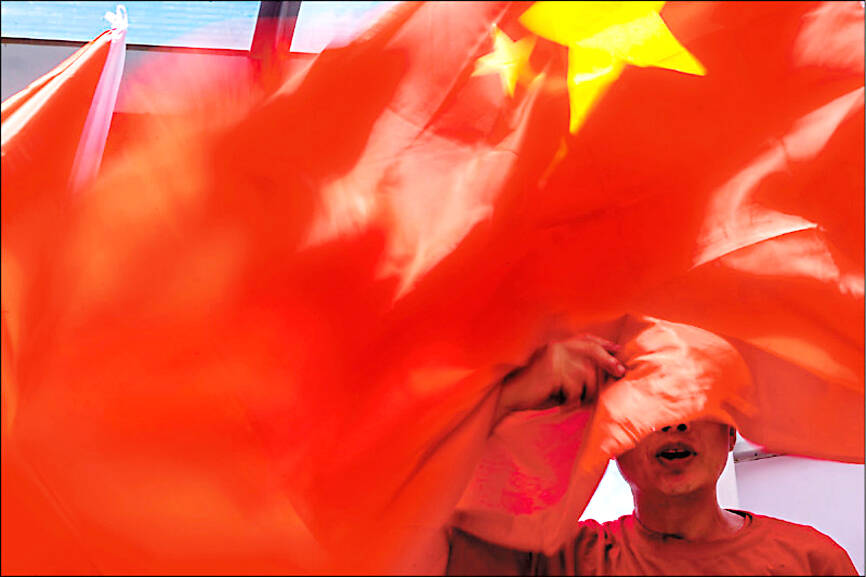Taiwanese rapper Chen Po-yuan (陳柏源) in a video showed how the Chinese Communist Party (CCP) bribes Taiwanese online influencers in its “united front” efforts to shape Taiwanese opinions.
The video was made by YouTuber “Pa Chiung (八炯)” and published online on Friday.
Chen in the video said that China’s United Front Work Department provided him with several templates and materials — such as making news statements — with some mentioning Chinese Nationalist Party (KMT) politician Hung Hsiu-chu (洪秀柱) and New Taipei City Mayor Hou You-yi (侯友宜) and asking him to write a song criticizing the Democratic Progressive Party.

A person’s face is covered by a Chinese flag fluttering in the wind in Beijing in an undated photograph.
Photo: Bloomberg
He said he had produced content for China as requested, but did not receive the royalties as promised by a Beijing-based management company for his song Chinese Bosses (中國老總), which is sung in an exaggerated Taiwanese accent with lyrics implying a pleasant life for businesspeople in China.
Chen said he also founded a company in China jointly with a business partner from the Jinjiang Taiwan Compatriots Friendship Association, who worked as his manager and later poached all his employees and capital invested in the company.
He was labeled as a fraud and a “Taiwanese independence separatist,” and attacked by Chinese Internet trolls, after he released an online video condemning his former business partner for betraying him.
“I finally realized the hard way that where I was staying [China] was not a place of democracy,” Chen said, adding that there is a huge difference between democratic Taiwan and autocratic China.
The Mainland Affairs Council yesterday said it is in control of the situation where Taiwanese influencers allegedly vilify the government’s policies, lure Taiwanese to work in China or engage in “united front” campaigns requested by the Chinese government.
The National Security Act (國家安全法) prohibits people from engaging, initiating, funding, hosting, manipulating, directing or developing an organization for a foreign country, including China, Hong Kong and Macau, external hostile forces, or any type of organizations, institutions, or groups established or controlled by them, or a representative dispatched by such organizations, institutions or groups, the council said.
The Anti-Infiltration Act (反滲透法) prohibits people from receiving instructions, being commissioned or funded by external hostile forces to engage in activities that disrupt social order, spread disinformation or interfere with elections, it said.
Article 33-1 of the Act Governing Relations Between the People of the Taiwan Area and the Mainland Area (臺灣地區與大陸地區人民關係條例) prohibits individuals, juristic persons, organizations or other institutions from engaging in any form of cooperation with the Chinese military, political parties or any organization of a political nature, it added.
Source: Taipei Times - 2024/12/08




















